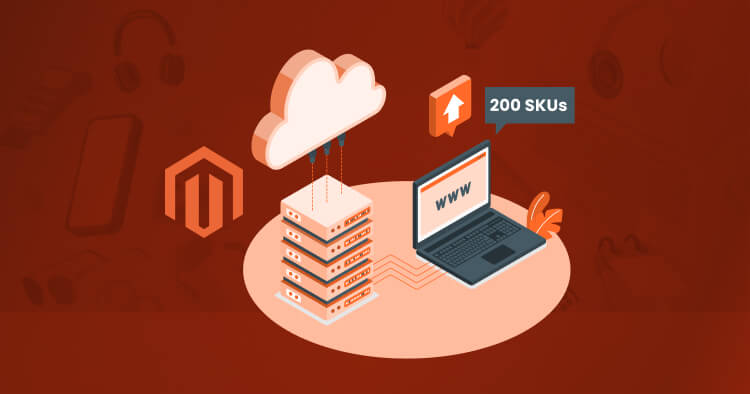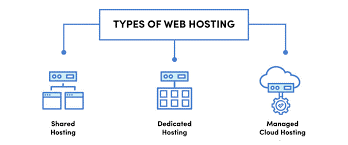Does Magento Shared Hosting Is Good Option?
Last Updated | October 31, 2023
Table of Contents
Magento shared hosting is a web hosting service specifically designed for websites built on the Magento e-commerce platform. Magento is a popular and powerful open-source e-commerce content management system (CMS) that allows businesses to create and manage online stores. When you choose shared hosting for your Magento website, it means that your website shares server resources with other websites hosted on the same server.
Imagine a scenario where your showcasing methodology performs exceptionally, however, your Magento 2 shared hosting can’t deal with the high traffic load. You never need to be in a circumstance like this. Aside from the exhibition, there are numerous components you should consider before buying Magento web hosting.
Types of Magento Web Hosting
Magento is a popular e-commerce platform, and when it comes to hosting a Magento-based website, it’s essential to choose the right type of hosting to ensure your site runs smoothly and efficiently. Technically, Magento can be used on all kinds of web hosting plans and platforms. However, not all of them are ideally suitable for the nature of this application. Here are some common types of Magento web hosting:
Because of various sorts of hosting, there is a ton of disarray in the market about which one is the best Magento facilitating. Hosting is a critical part of your web-based store’s prosperity since it guarantees the exhibition, accessibility, security, and steady quality of the Magento site. In this segment, we will talk about different sorts of hosting.
Shared Hosting:
- Shared hosting is the most basic and cost-effective hosting option.
- Your website shares server resources with other websites on the same server.
- It’s suitable for small Magento stores with low traffic and resource requirements.
- Performance can be impacted if other websites on the server experience high traffic.
- Shared Magento 2 hosting often comes with basic support services, which may not be suitable if you require more advanced technical assistance.
Dedicated Hosting:
- Dedicated hosting provides an entire physical server exclusively for your Magento store.
- It offers maximum performance, control, and security.
- Ideal for large e-commerce stores with high traffic and resource demands.
- Dedicated hosting for Magento can provide a reliable and high-performance environment for your e-commerce site, but it comes with a higher cost.
- With dedicated hosting, you have access to all the server’s resources, including CPU, RAM, and storage. This ensures that your Magento store can handle high levels of traffic and complex operations efficiently.
Cloud Hosting:
- Cloud hosting offers scalability and flexibility by hosting your site on multiple virtual servers in a cloud environment.
- Resources can be easily adjusted based on demand, making it suitable for growing Magento stores.
- The hosting supplier is liable for cloud server management, server provisioning, site uptime, execution, and any remaining hosting exercises.
- Popular cloud providers for Magento include AWS, Google Cloud, and Azure.
Other upheld hosting
VPS Hosting (Virtual Private Server):
- VPS hosting provides a virtualized portion of a dedicated server with dedicated resources.
- It offers more control and better performance compared to shared hosting.
- Suitable for small to medium-sized Magento stores with moderate traffic.
Managed Magento Hosting:
- Managed Magento Hosting service is the advanced form of cloud hosting where the hosting provider takes care of server management and optimization.
- They are often specialized in Magento hosting, ensuring your store runs efficiently.
- Suitable for businesses that prefer not to handle server management themselves.
Magento Cloud Commerce:
- This is Magento’s own cloud hosting solution, designed specifically for Magento 2.
- It offers a fully managed cloud environment with built-in features for e-commerce.
- Ideal for businesses looking for a hassle-free Magento hosting solution.
Self-Hosted:
- Some businesses choose to self-host Magento, which involves setting up and managing their own server infrastructure.
- This option provides the most control but requires technical expertise and resources.
Hybrid Hosting:
- A hybrid hosting solution combines on-premises and cloud hosting.
- Can be suitable for businesses that have specific security, compliance, or performance requirements.
Colocation Hosting:
- Colocation hosting involves placing your own server hardware in a data center.
- You have control over your hardware and software configurations.
- Typically used by larger enterprises with specific infrastructure requirements.
Magento 2 Shared Hosting Install
Installing Magento 2 on a shared hosting environment can be a bit more challenging than on a dedicated server or VPS due to limited resources and restrictions imposed by the hosting provider. However, it is still possible to install Magento 2 on shared hosting with some preparation and careful execution.
The performance of your Magento store may not be as robust as on a VPS or dedicated server. It’s crucial to choose a reputable hosting provider that can adequately support your Magento 2 installation.
Magento 2 Hosting Requirement
Magento 2 has specific hosting requirements to ensure optimal performance and security
that require more resources and flexibility than shared hosting plans can provide. Shared hosting is generally not recommended for Magento 2 due to the platform’s resource-intensive type.
Magento 2 Hosting requirements are not like other Php-Based CMS and eCommerce platforms.
Let me simplify the Adobe guidelines of hardware requirements for you. To run the Magento 2 store without a hitch, you need 2 Core CPUs and 4 GB RAM with the necessary extra room and transmission capacity. A minimum of 2GB of storage, but it’s important to note that Magento 2 requires more space as your product catalog and data grow.
In Magento 2.4.x, the Elasticsearch service is compulsory with a choice of Redis caching service for better performance. The outline of required software services is referenced below; for additional details, kindly visit the Adobe site.
Software dependencies
| Web Server | Apache 2.4 with mod_rewrite or Nginx. |
| PHP | PHP 7.2 or higher.
Required extensions and settings: PHP memory_limit of at least 2GB, PHP OPcache enabled. |
| Database | MySQL 5.6 or higher.
MariaDB 10.0 or higher. |
| PHP Composer | Composer 2.0 or higher.
Required for installing and updating Magento 2 and its components. |
For better performance and scalability, it’s highly recommended to consider a more strong hosting solution, such as a VPS (Virtual Private Server), cloud hosting, or dedicated hosting, which provides greater control and resources for your Magento 2 store.
Please note that these requirements may have changed since my last update, and it’s essential to refer to the official Magento 2 documentation for the most current hosting requirements before setting up your Magento 2 store. Additionally, your hosting requirements may vary depending on the size and complexity of your e-commerce website.
Difficulties of Magento Shared Hosting
While shared hosting can be a cost-effective choice for hosting Magento, it comes with some inherent difficulties and limitations due to the platform’s resource-intensive nature. Here are some of the challenges associated with using shared hosting for Magento:
- Performance Issues: Shared hosting means your website shares server resources with other websites. Magento is asset serious, and in a shared environment, your website’s performance can suffer, leading to slower load times and reduced user experience. Performance is the core factor in reducing conversion rate, impacting purchasing experience and high bob rate. It additionally influences your Website streamlining (Search engine optimization) positioning/ranking, Delay in loading web pages results in poor SEO scores.
- Limited Resources: Shared hosting plans often come with limited CPU, RAM, and bandwidth resources. These limitations can hinder the functionality of your Magento store, especially during traffic spikes or when running resource-heavy operations.
- Security Concerns: In shared hosting, you are sharing a server with other websites. If one of the websites on the same server is compromised, it can potentially affect the security of your Magento store. It’s crucial to have strong security measures in place to mitigate this risk.
- Customization Limitations: Shared hosting plans may have restrictions on the installation of certain extensions and customization options. This can limit your ability to tailor your Magento store to your specific needs.
- Scalability Challenges: As your Magento store grows, you may outgrow the resources provided by a shared hosting plan. This could lead to performance issues and require you to upgrade to a more robust hosting solution.
- Limited Support: Shared hosting providers may offer limited support for Magento-specific issues. You might not receive the level of support and expertise required to troubleshoot and optimize your Magento store effectively.
- Traffic Spikes: If your Magento store experiences sudden traffic spikes, shared hosting may not be able to handle the increased load efficiently, leading to site downtime or slow performance.
- Backups and Restorations: Some shared hosting providers have limited backup and restoration options. This can be problematic if you need to recover your store in case of data loss or issues.
- Dependency on Neighbors: Your site’s performance can be impacted by the activities of other websites on the same server. If a neighboring site uses excessive resources, it can affect your site’s performance.
- Downtime Issues: The eCommerce store downtime means downtime in business, additionally diminishes customer retention rate, and impacts the brand image. Website downtime issues are disappointing for visitors. In Magento shared hosting, the primary reasons for downtimes are DDoS assaults, the framework crashes because of high burden, and the store isn’t open from a specific area because of IP hindering shared hosting servers in an alternate area. It has been noticed a few times an ISPs obstructed the facilitating server IP because of some vindictive website(s) facilitated on a similar server.
- Resource Abuse: Shared hosting providers may impose resource usage limitations. If your site consistently uses more resources than allowed, you may face restrictions or even suspension.
To mitigate these difficulties, consider the following options:
- Optimize Your Magento Store: Use optimization techniques e.g. Avoid Built-in Cache – Use Redis and extensions to reduce resource usage and improve performance.
- Choose a Quality Hosting Provider: Look for hosting providers that specialize in Magento hosting or offer cloud-based hosting solutions designed to handle Magento’s requirements.
- VPS or Dedicated Hosting: If your store experiences growth and performance becomes critical, consider upgrading to a Virtual Private Server (VPS) or dedicated hosting for more control and resources.
- Content Delivery Network (CDN): Implement a CDN to help distribute content and reduce server load.
- Regular Backups and Security: Security is the most vital figure choice. To guarantee the greatest security, you should make sure that the hosting supplier server is safeguarded with a hardware firewall and working framework Shorewall. Implement robust security measures and maintain regular backups to protect your store’s data.
- Reliability: Some Magento shots will offer uptime to ensure recorded as a hard copy on their site. It could be covered in the Agreements, however, search for this number and its presence.
Conclusion
In summary, while Magento can be hosted on shared hosting It’s cost-effective and suitable for small to medium-sized businesses, but it’s important to choose a reliable hosting provider that can meet the technical requirements and security needs of your Magento-based online store, it may not be the best option for larger or resource-intensive stores. You should carefully consider your specific needs and future growth plans when selecting a hosting solution for your Magento e-commerce site.
FAQs
Q: Is shared hosting enough to host a Magento site with less than 200 SKUs?
Yes, shared hosting can in fact be utilized to have a Magento site with less than 200 SKUs (Stock Keeping Units), but it may not provide the ideal performance and expandability for an online business stage like Magento. Shared hosting includes various sites having similar server assets, which can prompt restrictions with regard to handling power, memory, and capacity.
At times, a shared server may be crowded with hundreds of accounts – all sharing the same resources. Because of this, shared hosting accounts are rarely suitable for Magento hosting since eCommerce sites need good availability of resources to function well.
For a Magento site with under 200 SKUs, it is prescribed to consider alternative hosting choices like VPS (Virtual Confidential Server) hosting or cloud hosting/facilitating. These hosting choices offer devoted assets, further developed adaptability, and better execution, which are more qualified for the requests of an online business stage.










